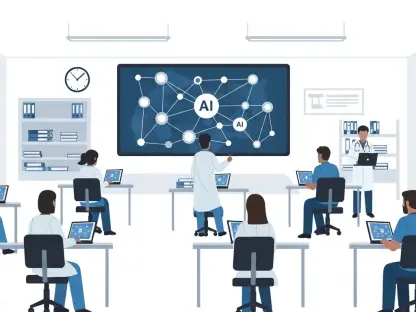In the rapidly evolving realm of AI in healthcare, few individuals have positioned themselves at the crossroads of medical technology and innovation as effectively as Faisal Zain. With a wealth of experience in crafting and integrating medical devices for diagnostics and treatment, Zain represents the vanguard of AI advancements, particularly as they impact the healthcare industry.
How do you see the integration of AI, such as OpenAI’s models, into tools like Google’s Chrome browser impacting the daily digital experiences of users?
The integration of AI models into widely used tools like Chrome will undoubtedly redefine user experiences by making interactions more intuitive and personalized. People will experience seamless suggestions, real-time data interaction, and predictive responses that are context-aware. This kind of AI-driven environment could enhance both productivity and comfort, effectively transforming our digital landscape into one that’s smarter and more responsive.
Can you explain the shift from data training to real-time inference in AI? How does this shift benefit sectors like healthcare?
The shift from a focus on data training to real-time inference signifies moving from building AI abilities to applying them in real-world scenarios instantaneously. In healthcare, this means quicker decision-making processes and the ability to adapt to new data on the fly, providing immediate insights that can improve diagnostic accuracy, enhance treatment plans, and optimize patient care. This direct application is pivotal in critical situations where timely decisions can save lives.
In your opinion, what are the key elements required to keep the human element central in an increasingly autonomous AI ecosystem?
Maintaining the human element in AI requires a balanced approach focused on transparency, empowerment, and collaboration. AI should enhance human capabilities, offering tools that provide clarity and actionable insights rather than making unilateral decisions. We must ensure that AI complements human judgment, maintains accountability, and respects ethical standards, fostering environments that value human expertise alongside technological advancements.
Why is transparency in AI systems, especially in healthcare, considered non-negotiable? How can AI systems avoid being seen as “black boxes”?
Transparency is crucial as it builds trust and ensures accountability, especially in healthcare where the stakes are high. AI should function in a way that’s understandable and predictable, allowing users to see how decisions are made. Achieving this involves developing models that provide insight into their processes and reasoning, enabling users to trace decisions back to their foundational data and learnings.
What potential do pre-built AI agents have for the healthcare industry? What challenges might arise from integrating these agents into clinical routines?
Pre-built AI agents hold immense potential to streamline operations, reduce administrative burdens, and enhance patient experiences by automating repetitive tasks and offering personalized care recommendations. However, integrating these agents into clinical routines poses challenges such as ensuring compatibility with existing systems, maintaining data privacy, and addressing concerns around reliability and decision-making authority.
How can vertical integration, such as embedding AI models into browsers, be both beneficial and risky? What guardrails should be in place to mitigate these risks?
Vertical integration brings about streamlined user experiences and better synergy between different digital tools. However, it can lead to monopolistic control, stifling competition and innovation. To mitigate these risks, we should employ open standards and governance frameworks that promote transparency and democratize access to technology, enabling equal opportunities for innovation and participation.
Why is adopting open standards and governance frameworks important for the AI ecosystem, especially in regulated environments like healthcare?
Adopting open standards ensures interoperability, fairness, and transparency across the AI ecosystem, crucial for regulated industries like healthcare. It facilitates competition and innovation, helping to prevent vendor lock-in and allowing various stakeholders to contribute to and benefit from AI advancements while safeguarding patient data and ensuring adherence to ethical guidelines.
What role does usability play in building trust in AI systems among healthcare professionals? How do intuitive systems and clear feedback facilitate AI adoption in healthcare?
Usability is key to earning the trust of healthcare professionals as it ensures AI tools can be seamlessly integrated into existing workflows. When systems are intuitive and provide clear feedback, they simplify the learning curve, increase engagement, and encourage adoption. An AI tool that aligns with clinical reasoning and is easily understood by users builds confidence and fosters effective use in practice.
What should governance frameworks for AI in healthcare include to ensure transparency and trust?
Governance frameworks should encompass guidelines on data collection and usage, model transparency, and accountability mechanisms to address errors and biases. They should also facilitate stakeholder engagement and incident reporting to ensure ongoing evaluation and improvement of AI systems, reflecting a commitment to ethical responsibility and fostering a culture of trust.
Why is ethical infrastructure essential for AI systems in clinical decision-making? What components make up a robust ethical infrastructure?
A robust ethical infrastructure is critical to navigate the complexities of clinical decision-making, where errors can have serious consequences. It includes bias detection, model explainability, consent processes, and transparency. These frameworks ensure AI systems are developed and implemented responsibly, minimizing harm while maximizing benefits across diverse patient populations.
How can AI potentially serve marginalized populations in healthcare while avoiding the risks of bias and inaccuracy?
AI has the potential to bridge accessibility gaps by tailoring care to underserved populations. To avoid biases, it’s imperative to use diverse datasets and implement continuous monitoring and adjustments of AI algorithms. Encouraging collaboration with marginalized communities during development can ensure these tools are equitable and truly address their unique needs.
Can you discuss the role of human-centered principles in guiding AI innovation? How do these principles ensure positive impacts on people, systems, and society?
Human-centered principles guide AI innovation by prioritizing the needs and experiences of users, ensuring technology serves a beneficial role in society. By focusing on inclusivity, transparency, and ethical responsibility, these principles drive the creation of AI systems that are not only technologically advanced but also societally responsible and empathetic to human challenges.
As AI systems become more integrated into everyday operations, what measures should be taken to ensure responsibility, equity, and humility in their use?
Implementing strong ethical guidelines and continuous oversight is necessary as AI becomes more integrated. Encouraging diversity in technology teams, enforcing accountability through transparency, and promoting ongoing education about AI impacts can foster a culture of humility and responsibility. These measures help ensure AI serves as a partner in achieving equitable outcomes and fostering societal well-being.









